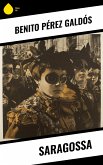In 'Saragossa', Benito Pérez Galdós intricately weaves a tapestry of narratives that reflects the socio-political turbulence of 19th-century Spain. Employing a realist literary style characterized by detailed characterizations and vivid descriptions, Galdós presents an immersive portrait of the city of Zaragoza amidst the backdrop of war and societal unrest. The novel eloquently explores themes of conflict, identity, and the human condition, skillfully navigating the intricate interplay of personal and collective experiences. The fragmented structure of the narrative, reminiscent of a mosaic, invites readers to piece together a broader understanding of life during this tumultuous period. Benito Pérez Galdós, a key figure in Spanish literature, was profoundly influenced by the cultural and political climate surrounding him. His works often reflect a deep empathy for the struggles of the common people and a fierce commitment to social realism. Having witnessed firsthand the effects of war and poverty, Galdós's portrayal of Zaragoza serves not only as a backdrop but as a living character in its own right, shaping the lives and destinies of the protagonists within. 'Saragossa' is a must-read for those interested in Spanish literature, history, and the exploration of human nature. Galdós's masterful storytelling and rich, nuanced characters invite readers to engage deeply with the text, rendering it a timeless exploration of resilience and identity that resonates with contemporary themes.
Dieser Download kann aus rechtlichen Gründen nur mit Rechnungsadresse in A, B, BG, CY, CZ, D, DK, EW, E, FIN, F, GR, H, IRL, I, LT, L, LR, M, NL, PL, P, R, S, SLO, SK ausgeliefert werden.









